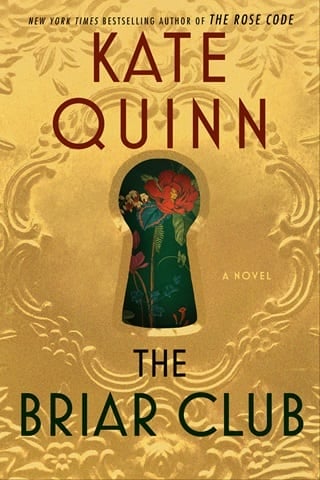Interstitial
Thanksgiving 1954 Washington, D.C.
There are two whispered arguments going on in Briarwood House, one over a murder weapon and one over something much more important. The house has been eavesdropping avidly as one of the policemen rummages under the couch in the parlor, calling out: “Looks like the second murder weapon, sir, it’s all covered in gore—” but then another conversation sends the house’s gaze spinning back toward the kitchen.
“I could make you some tea, Mom,” Pete is saying, patting his mother’s shoulder where she sits a little ways from the rest of her boarders, but she just smacks him off.
“Tea! As if anyone could drink tea with blood drying on the walls ; aren’t you just the most tactless, brainless—”
“I thought it might help your nerves,” Pete says valiantly, but precious little thanks he’s going to get for being thoughtful, the house thinks.
“The only thing that would help my nerves is getting out of this house!” Mrs.Nilsson hisses. “And let me tell you, we are getting out of this house. As if I’ll stay in a place where two murders have—”
“We should stay in a hotel for a few days,” Pete agrees. “Good idea—”
“A hotel? A hotel , do you think I’m made of money?” Mrs.Nilsson draws herself up in her straight-backed kitchen chair. “No, no. We’re getting rid of this place altogether, the moment we can. I’ve had offers before, but now I’ve a mind to—”
“What?” Pete sounds as appalled as the house feels. “Mom, you can’t sell up, this is our home.”
“—there was an offer from McTurney no flowers being added to Grace’s wall vine...
The wall vine would be painted over , the house realizes with a recoil that makes the windows rattle. Everything would be ripped out, modernized, made into a box of a showroom where stiff living room sets were arranged, but no one actually... lived.
A house that doesn’t contain a family anymore, but a store instead—well, it can’t really call itself a house.
“We can’t just kick out all the boarders in the wake of something like this,” Pete is arguing with his mother, indicating all the police commotion, but she hisses, “ We’ll talk about it later ,” and the house feels suddenly, strangely sick. Abruptly the stakes of this endless Thanksgiving day—the question of who will be hauled away in handcuffs and who will not; the even bigger question of why two bodies lie dead and bloodied on the floor tonight—have just been raised so much higher.
Don’t let me go , Briarwood House thinks, hunching protectively around its kitchen-full of ladies. Please don’t let me go.
But they can’t hear.
The house barely pays any attention as the detective comes into the kitchen, feeling sick all the way down to its foundations. But the ladies sit up straighter, every whispered discussion dying away as the second murder weapon is produced—covered gruesomely in sticky, drying gore.
The detective aims a piercing look around the room. “Anyone want to tell me who in this house owns a baseball bat?”
 Fullepub
Fullepub 



